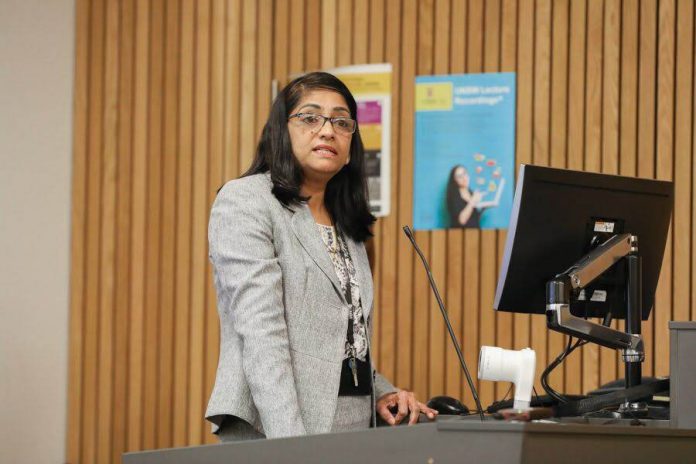
UNSW’s Assoc. Prof Jayashri Ravishankar has been named in the prestigious Australian Awards For University Teaching for 2019.
The awards are an Australian Government initiative to recognise developments in teaching practice and student learning.
The Deputy Head of School (Education) in the University’s School of Electrical Engineering and Telecommunications, Prof. Jayashri Ravishankar was cited in the category Outstanding Contributions To Student Learning.
Her transformative teaching practices have involved “developing innovative online and face-to-face learning strategies and promoting an inclusive classroom in large electrical engineering courses that improve the employability skills of students,” according to the citation letter.
“Much of my work has been with postgraduate international students, helping them get the most of their two-year stay in Australia,” Prof. Ravishankar told Indian Link.
Starting at UNSW in 2010, Prof. Jayashri Ravishankar has initiated strategies that help students both complete the course to a satisfactory level and also make them employable, developing leadership and teamwork skills.

“The Australian market looks for employability rather than academic prowess, [so] I pull industry in as part of the course,” she revealed. “Not just through guest lectures, but virtual reality simulations from industry sites. Industry guests do come in and students are able to present their understanding so that direct links are created.”
Additionally, Prof. Jayashri Ravishankar’s contribution has been in the development of online resources that are now a hallmark of her teaching practice.
“In my first lecture at UNSW I spoke into a microphone in front of 450 students, whereas in India I was used to smaller classes of 70 each,” she recalled. “The lack of direct contact with the students here rankled somewhat – I could not even see their reactions, nor understand whether they had taken something away from my lecture. Luckily UNSW had resources like recording facilities that I used frequently – to make small films and upload for students. Often times students would be seeing these films as I spoke to them in class. Now, of course, there are even more resources, like interactive websites and VR. Yes, it is a bit of work for teachers like me, but once the resources are created, they can be regularly updated.”
These days the work starts for Prof. Ravishankar as the students arrive. “They come here with no connections, so I help them build these with mentoring with ex-students. Within the classroom, I take pains to mix the students up to increase the diversity in teams.”
This makes her work here very different to what it was like at Anna University in Chennai, India, where she taught after taking a Ph.D. in electrical engineering.
“In India, teaching is still largely traditional – all you need is good knowledge of your subject. It is changing though – when I taught there ten years ago, we did not use online resources at all to share material, and still worked with blackboards and whiteboards.”
As well, she observed, the university dictated the curriculum from which you couldn’t deviate because the public exams were set accordingly. “Here, I’m enjoying the academic freedom to set my own curriculum based on what is cutting edge in the body of knowledge. I’m also conscious of the fact that the way the students learn is itself changing, so we need to change appropriately.”
Another challenge – or opportunity – is the gender divide in STEM subjects.
“In India, girls are encouraged towards higher education: they score the marks and gain entry into sought-after courses.
Here, on the other hand, there is dignity of labour so ‘high-status professions’ don’t exist. Girls are attracted to service-type professions because they feel they are serving society, like medicine or teaching. And then there’s the issue of maths phobia. Our young people are not driven to do maths. I’m amazed that you can finish school here without studying maths, unlike in India where maths is compulsory. Also, the options at high school here are much wider, so it is easy to deviate from STEM.”
Prof. Ravishankar is keenly involved in outreach for school students. “I give students a taste of electrical engineering – bringing them to labs and getting them to work on simple experiments. I like to talk to them in Year 10 about subject choices.”
She agrees that other countries might soon get ahead of us in this realm.
“I’ve been doing some work in Myanmar since 2013, helping to establish an engineering institute thereby developing curricula. I’m pleased to see the classrooms there filled with girls. Just like in India, entry to these institutes are determined by marks: girls do well at school and automatically choose STEM subjects.”
What is her advice to girls then?
“Engineering is not just maths. Maths is required, but there’s lots more to engineering. You can help society directly with engineering. With some of our most pressing issues in society today – climate change, renewable energy – you can contribute directly to the nation and to society.”
Prof. Ravishankar’s own research is in renewable energy, developing microgrids for use in Australia’s remote areas and later integration into the main grid.
She is also involved in taking this technology to remote areas in India – besides marketing an Australian education to Indian students.
READ ALSO: India a great opportunity for Australian educators




